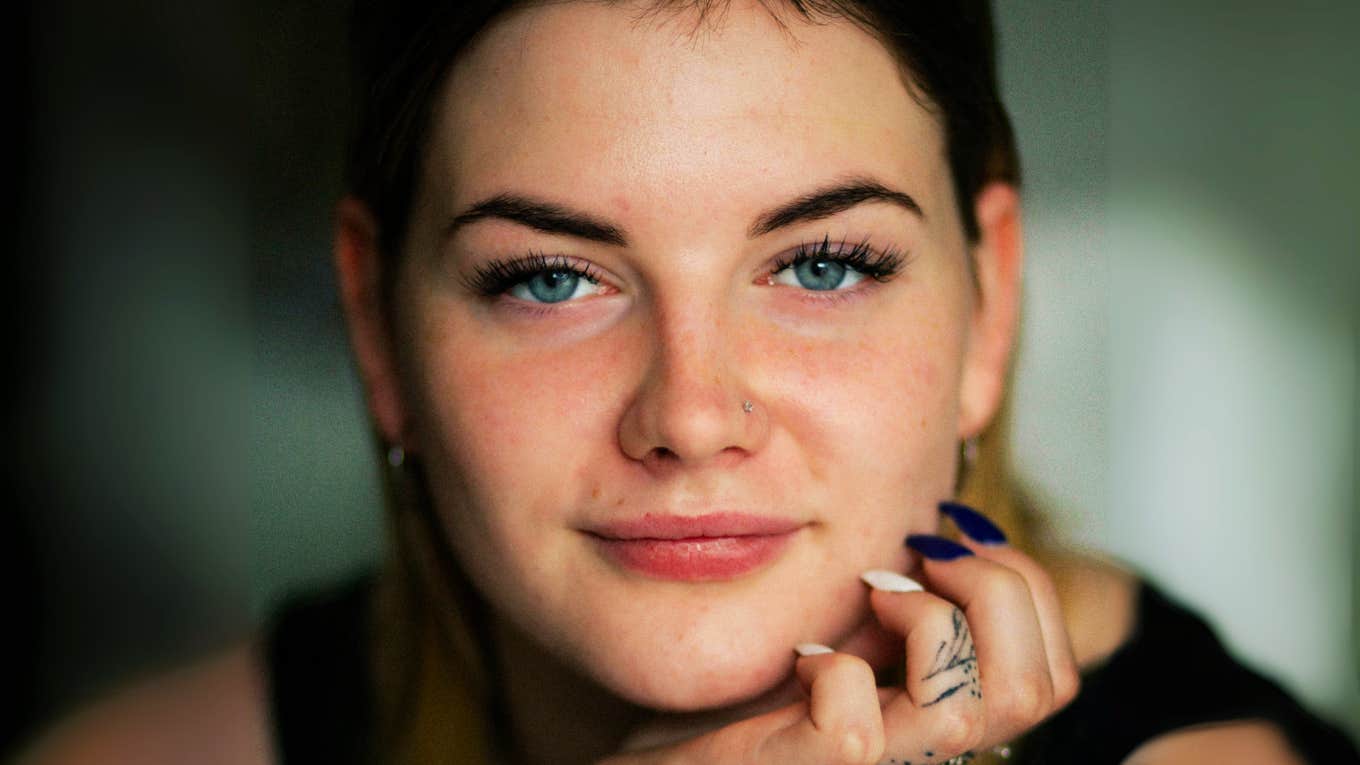10 Things Brené Brown Said That Finally Got Me To Stop Pretending I’m Fine
The moment I stopped pretending I was fine was the moment I finally started living.
 olga Volkovitskaia | Pexels
olga Volkovitskaia | Pexels Love is a mystery, but for me, it used to mean becoming less of myself just to be accepted by others. I thought I was being brave by shrinking to fit in: quieting my voice, softening my personality, hiding anything that might make me seem "too much." What I didn't realize was that by pretending I was fine, I was sacrificing authenticity for approval.
All that hiding came with a heavy dose of shame — the kind that whispers you're never really enough. The harder I tried to earn love, the more disconnected I felt from myself and the people around me. That shift began after I read The Gifts of Imperfection by researcher and motivational speaker Brené Brown.
Her words cracked something open in me — about worthiness, vulnerability, and what it means to show up as your whole self. Trying to be what others expect doesn't work, but loving yourself through your flaws is where real connection begins.
Here are ten things Brené Brown said that finally got me to stop pretending I'm fine:
1. 'Shame loses power when you speak it out loud'
When I feel ashamed about a mistake I've made or something happens that makes me feel small, I want to run and hide. It's a natural reaction.
However, hiding is the oxygen that sets shame aflame. According to Brown, shame hates exposure. Talking to someone and revealing what happened, how you feel, and getting the negative emotions out allows healing to begin.
2. 'Not everyone deserves your vulnerability'
 ProximaCentauri1 | Shutterstock
ProximaCentauri1 | Shutterstock
For years, I spent my life thinking that the people who were 'supposed' to love me knew how to love me well.
But Brené Brown says, "When we're looking for compassion, we need someone who embraces us for our strengths and struggles. We need to honor our struggle by sharing it with someone who has earned the right to hear it. When we're looking for compassion, it's about connecting with the right person at the right time about the right issue."
Brown explains that vulnerability isn’t about winning or losing; it’s about having the courage to show up and be visible even when we can't control the outcome.
This may mean your best friend might not be the right person to talk to about a problem, but that doesn't mean you can't vent. Instead, your coworker might be a better person to talk to. It comes down to understanding which of your relationships serve each particular feeling or struggle.
3. 'Real courage looks quiet, not heroic'
In moments when we become overwhelmed, we have been taught to push through until the situation passes. Instead, it's better to love yourself by stepping back and evaluating what you need, and then expressing it.
Brown shared a touching story about how she avoided the pain of confrontation by pushing through during a school speech where she was the keynote speaker. In these moments, you shouldn't strive for perfection — instead, what's needed is ordinary courage.
Brown says, "ordinary courage is about putting our vulnerability on the line." Rather than thinking you have to do more to be more, you can simply be yourself, which is a form of bravery that helps you love yourself, even in imperfection.
4. 'Boundaries are an act of love'
If you've ever tried to find love by people-pleasing and being what you're not, you'll identify with feeling ashamed for setting boundaries for yourself, or worse, actually holding someone you love accountable for their actions. Don't! Brown shares that boundaries are pathways to compassion, helping to make way for true acceptance.
As she puts it in Atlas of the Heart, "Boundaries are a prerequisite for compassion and empathy… If there’s no autonomy between people, then there’s no compassion or empathy, just enmeshment."
If I'm struggling with a situation where I feel things aren't going as planned, I can set a boundary. If someone crosses it, I can take action without feeling embarrassed or out of line. It's not an easy thing to do, but according to Brown, "truly committed compassion practitioners were also the most boundary-conscious people".
5. 'You don't have to earn love — you're already enough'
 bodnar.photo | Shutterstock
bodnar.photo | Shutterstock
Feeling like you're enough and that you don't have to struggle to find love or work isn't an easy feeling to come by.
I've personally struggled with feelings of insecurity, thinking I should hide things about myself that might disappoint others. However, according to Brown, you should never feel the need to prove yourself or struggle to receive the love you deserve.
She states, "love and belonging will always be uncertain." Belonging is a journey, and the first step to take is accepting who you are, as you are in this moment, which is 'enough'.
6. 'Ttrust your instincts'
Brown shares a story about how she was asked to speak at an event in a way that conflicted with her own beliefs. While she gave in to the request in the moment, eventually she trusted her discomfort.
There are times when people will ask you to do things that are outside of your comfort zone. When you feel uncomfortable, it's crucial to tap into 'ordinary courage' and trust your instincts. But in case you don't, it's okay to use that memory to learn and explore who you are, to embrace it.
7. 'Shame resilience is built by facing things, not avoiding them'
The first thing a person usually wants to do when they feel ashamed about a situation is run, hide, and avoid it. However, owning your shame not only improves the situation, but it also grows your resilience and fosters self-love and compassion towards others.
As Brown says, "own your story. Tell the story. Practice courage." And even if you do it through tears, you will be stronger and wiser at the end of it. Once you expose your shame, it loses its power.
8. 'Being yourself is risky, but hiding is worse'
When you are your true self, you open yourself up to vulnerability. Authentic living and owning who you are is a risk worth taking, despite how others may react to you. But hiding who you are is even riskier.
Brown says, "...being true to ourselves is the best gift we can give the people we love." It takes far too much time and energy to be what you're not. Allowing yourself to be free makes room for self-love and time with the people who accept you for who you are.
9. 'When in doubt, D.I.G. deep'
 maxbelchenko | Shutterstock
maxbelchenko | Shutterstock
Giving in to shame is draining and makes opening up and becoming more vulnerable a lot more work.
But instead of allowing yourself to be taken in by what others want (which often happens), dig deep within yourself and find the strength to stand your ground. Here's what D.I.G. stands for, in this case:
Deliberate: Brown says to "Stand your spiritual ground". In her Wholehearted Living study, she found that living aligned with your values and being vulnerable are intertwined. Choosing your path helps banish shame and builds your integrity and courage. By reaffirming my commitment to myself and what I believe in, I can focus on that message instead of backing down.
Inspired: Through her work on shame resilience, Brown discovered that hearing others' stories helps us embrace our own and stay grounded, even in discomfort. She shares how she allows the story of others to inspire her own. This enabled me to see that my story is like a parallel universe of the stories expressed by others. By getting inspired rather than being intimidated, I learn to embrace both sides without feeling pushed away from my authentic self and into shame.
Get Going: Brown’s Shame Resilience Theory emphasizes that acknowledging shame, seeking connection, and taking action — even when it's challenging — transforms shame into a catalyst for growth. That’s exactly what “getting going” through vulnerability does. She uses the goal of authenticity to keep her moving forward. Often, fear can cause a person to stop and remain stuck in shame. But by setting a goal and moving towards it, my fears are left behind.
10. 'Your dark parts hold your light'
Brown says, "Only when we are brave enough to explore the darkness will we discover the infinite power of our light."
Exploring the darkness of what you fear isn't easy, but it's so worth it. The more I know about myself, the greater empowerment I experience. Few people can surprise me with what they see. The more I seek to find those dark parts, the better use I can make of critics when they reveal a flaw.
I can practice the D.I.G. Deep exercises or expose my shame to the right person. The result is more authenticity and joy.
Aria Gmitter, M.S., M.F.A., is YourTango's Senior Editor of Horoscopes and Spirituality. She studies with the Midwestern School of Astrology and is a member of the South Florida Astrological Association.
Created in partnership with Hazelden Publishing.

